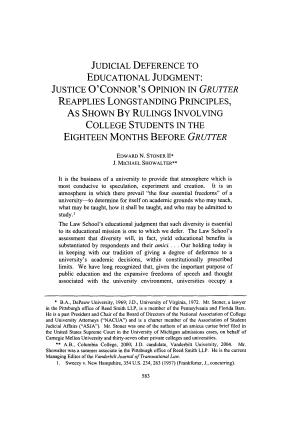Judicial Deference to Educational Judgment: Justice O'Connor's Opinion in Grutter
January 2004

Other pages in the O'Connor Institute Online Archive mentioned in this article:
| NAME / TITLE | TYPE |
|---|---|
| Grutter v. Bollinger | Supreme Court Opinion |
DISCLAIMER: This text has been transcribed automatically and may contain substantial inaccuracies due to the limitations of automatic transcription technology. This transcript is intended only to make the content of this document more easily discoverable and searchable. If you would like to quote the exact text of this document in any piece of work or research, please view the original using the link above and gather your quote directly from the source. The Sandra Day O'Connor Institute does not warrant, represent, or guarantee in any way that the text below is accurate.
Article Text
(Excerpt, Automatically generated)
JUDICIAL DEFERENCE TO EDUCATIONAL JUDGMENT:
JUSTICE O'CONNOR'S OPINION IN GRUTTER
REAPPLIES LONGSTANDING PRINCIPLES, As SHOWN BY RULINGS lNVOLYING COLLEGE STUDENTS IN THE
EIGHTEEN MONTHS BEFORE GRUTTER
EDWARD N. STONER II*
J. MICHAEL SHOWALTER**
It is the business of a university to provide that atmosphere which is most conducive to speculation, experiment and creation. It is an atmosphere in which there prevail "the four essential freedoms" of a university-to determine for itself on academic grounds who may teach, what may be taught, how it shall be taught, and who may be admitted to study.1
The Law School's educational judgment that such diversity is essential to its educational mission is one to which we defer. The Law School's assessment that diversity will, in fact, yield educational benefits is substantiated by respondents and their amici.... Our holding today is in keeping with our tradition of giving a degree of deference to a university's academic decisions, within constitutionally prescribed limits. We have long recognized that, given the important purpose of public education and the expansive freedoms of speech and thought associated with the university environment, universities occupy a
- B.A., DePauw University, 1969; J.D., University of Virginia, 1972. Mr. Stoner, a lawyer in the Pittsburgh office of Reed Smith LLP, is a member of the Pennsylvania and Florida Bars. He is a past President and Chair of the Board of Directors of the National Association of
